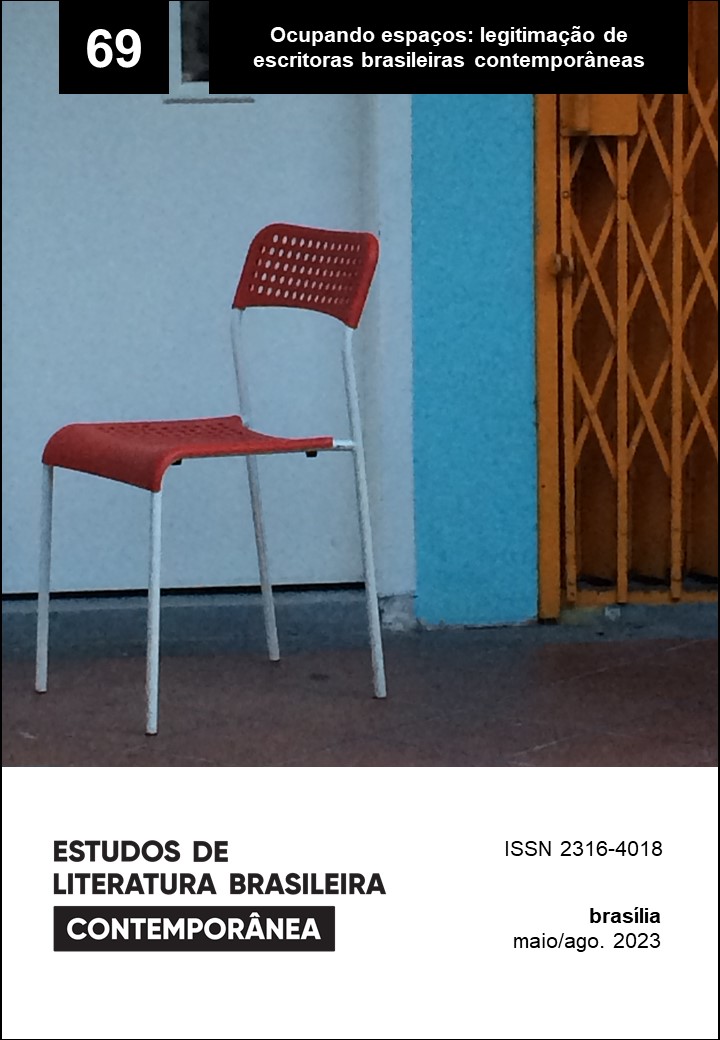Memórias que urgem nossa (re)existência: Eu sou macuxi e outras histórias de Julie Dorrico
Palavras-chave:
macuxi; literatura indígena; intelectualidade indígena; política cultural indígenaResumo
Este ensaio examina o livro Eu sou macuxi e outras histórias de Julie Dorrico como uma auto-história de sobrevivência inserida nos atuais estudos literários dos povos originários que crescem a partir dos anos 1980 e 1990, propiciados pela resistência indígena que confronta o poder do Estado brasileiro, mais assiduamente desde os anos 1970. A ficção de Dorrico é também considerada no âmbito tanto da produção da forte tradição intelectual e filosófica indígena atual, progressivamente mais visível, presente e empoderada, como também de seus próprios artigos como pesquisadora e doutora em teoria literária. O ensaio mostra que a narrativa poética de seu livro toca em questões político-culturais ligadas aos campos de produção cultural e literário brasileiros, bem como demonstra afinidade com metodologias teóricas das pesquisas indígenas no território americano como um todo. Mostra que o trabalho intelectual de Dorrico é indissociável da prática de resistência política e, portanto, cultural e socialmente vital para todos os povos originários americanos.
Referências
ANDRELLO, G. L. (2004). Tauperang (verbete). Povos Indígenas no Brasil Instituto Socioambiental Povos indígenas em Roraima. Disponível em: https://pib.socioambiental.org/pt/Povo:Taurepang Acesso em: 10 jan. 2023.
» https://pib.socioambiental.org/pt/Povo:Taurepang
BRILL, S. B. (1996). Native American Autobiography: An Anthology. Biography, v. 19, n. 3, p. 308-312. Disponível em: https://www.jstor.org/stable/23539769 Acesso em: 30 jun. 2023.
» https://www.jstor.org/stable/23539769
BRILL, S. B.; KRUPAT, A. (org.) (1994). Native American Autobiography: An Anthology (review) Madison: Wisconsin University Press.
CLIFFORD, J. (2013). Returns: Becoming Indigenous in the Twenty-First Century. Cambridge: Harvard University Press, 2013.
DORRICO, J. (2017). Alteridade Indígena: Voz-Práxis Via Literatura em A Queda do Céu: Palavras de Um Xamã Yanomami. Opinião Filosófica, Porto Alegre, v. 8, n. 1, p. 59-72. https://doi.org/10.36592/opiniaofilosofica.v8i1.730
» https://doi.org/10.36592/opiniaofilosofica.v8i1.730
DORRICO, J. (2018). Vozes da literatura indígena brasileira contemporânea: do registro etnográfico à criação literária. In: DORRICO, J.; DENNER, L. F.; CORREIA, H. H. S.; DENNER, F. (org.). Literatura indígena brasileira contemporânea: criação, crítica e recepção. Porto Alegre: Fi. p. 227-255.
DORRICO, J. (2019). Eu sou macuxi e outras histórias Nova Lima: Caos & Letras.
DORRICO, J. (2022). A fortuna crítica (da exclusão): Makunaimî na literatura indígena contemporânea. Revista do Centro de Pesquisa e Formação, São Paulo, n. 14, p. 112-131. Disponível em: https://www.sescsp.org.br/revista-do-centro-de-pesquisa-e-formacao-no-14-dossie-diversos-22/ Acesso em: 10 jan. 2023.
» https://www.sescsp.org.br/revista-do-centro-de-pesquisa-e-formacao-no-14-dossie-diversos-22/
FIOROTTI, D. A. (2018). Teren, eren e panton: poetnicidade oral Macuxi. Estudos de Literatura Brasileira Contemporânea, Brasília, n. 53, p. 101-127. https://doi.org/10.1590/2316-4018534
» https://doi.org/10.1590/2316-4018534
FIOROTTI, D. A.; MANDAGARÁ, P. (2018). Contemporaneidades ameríndias: diante da voz e da letra. Estudos de Literatura Brasileira Contemporânea, Brasília, n. 53, p. 13-21. https://doi.org/10.1590/2316-4018531
» https://doi.org/10.1590/2316-4018531
GRAÚNA, G. (2013). Contrapontos da literatura indígena contemporânea no Brasil Belo Horizonte: Maza Edições.
KOPENAWA, D.; ALBERT, B. (2015). A queda do céu: palavras de um xamã yanomami. Tradução de Beatriz Perrone-Moisés. São Paulo: Companhia das Letras.
KRENAK, A. A. L.; COHN, S. (2015). Encontros Rio de Janeiro: Azougue.
KRUPAT, A. (1985). For Those Who Come After: A Study of Native American Autobiography Berkeley: California University Press. Disponível em: http://ark.cdlib.org/ark:/13030/ft987009fp/ Acesso em: 10 jan. 2023.
» http://ark.cdlib.org/ark:/13030/ft987009fp/
KRUPAT, A. (org.) (1994). Native American Autobiography: An Anthology Madison: Wisconsin University Press.
MENCHÚ, R.; BURGOS-DEBRAY, E. (1983). Me llamo Rigoberta Manchú, i así mi nasció la consciência Havana: Casa de las Americas.
OLIVIERI-GODET, R. (2020). Vozes de mulheres ameríndias nas literaturas brasileira e quebequense Rio de Janeiro: Edições Makunaima.
RADIN, P. (1926). Crashing Thunder: The Autobiography of an American Indian Nova York: D. Appleton and Co.
SÁEZ, O. C. (2006). Autobiografia e sujeito histórico indígena Novos Estudos CEBRAP, São Paulo, n. 76, p. 79-195.
SALLES, J. (2021). O relato de vida indígena e outros (sub)gêneros literários em A queda do céu: palavras de um Xamã Yanomami, Meu nome é Rigoberta Menchu e assim nasceu minha consciência e Bobbi Lee: Indian rebel struggles of a Native Canadian Woman. Ilha do Desterro, Florianópolis, v. 74, n 2, p. 231-250. https://doi.org/10.5007/2175-8026.2021.e78659
» https://doi.org/10.5007/2175-8026.2021.e78659
SMITH, L. T. (1999). Decolonizing Methodologies: Research and Indigenous Peoples Dunedin: Otago University Press.
TAUREPANG; MACUXI; WAPICHANA; ARIEL, M.; ANDRADE, M.; GOLDEMBERG, D.; KOCH-GRÜNBERG, T.; RENNÓ, I. (2019). Makunaimã: o mito através do tempo São Paulo: Elefante.
WILSON, S. (2001). What is indigenous research methodology? Canadian Journal of Native Education, Edmonton, v. 25, n. 2, p. 175-179.
Downloads
Publicado
Edição
Seção
Licença

Este trabalho está licenciado sob uma licença Creative Commons Attribution-NoDerivatives 4.0 International License.
Autores que publicam nesta revista concordam com os seguintes termos:
a) Os(as) autores(as) mantêm os direitos autorais e concedem à revista o direito de primeira publicação, sendo o trabalho simultaneamente licenciado sob a Licença Creative Commons de Atribuição-Não Comercial 4.0, o que permite o compartilhamento do trabalho com reconhecimento da autoria do trabalho e publicação inicial nesta revista.
b) Os(as) autores(as) têm autorização para assumir contratos adicionais separadamente, para distribuição não-exclusiva da versão do trabalho publicada nesta revista (ex.: publicar em repositório institucional ou como capítulo de livro), com reconhecimento de autoria e publicação inicial nesta revista.
c) Autores têm permissão e são estimulados a publicar e distribuir seu trabalho on-line (ex.: em repositórios institucionais ou na sua página pessoal) após o processo editorial, já que isso pode gerar alterações produtivas, bem como aumentar o impacto e a citação do trabalho publicado (Veja O Efeito do Acesso Livre).
d) Os(as) autores(as) dos trabalhos aprovados autorizam a revista a, após a publicação, ceder seu conteúdo para reprodução em indexadores de conteúdo, bibliotecas virtuais e similares.
e) Os(as) autores(as) assumem que os textos submetidos à publicação são de sua criação original, responsabilizando-se inteiramente por seu conteúdo em caso de eventual impugnação por parte de terceiros.


